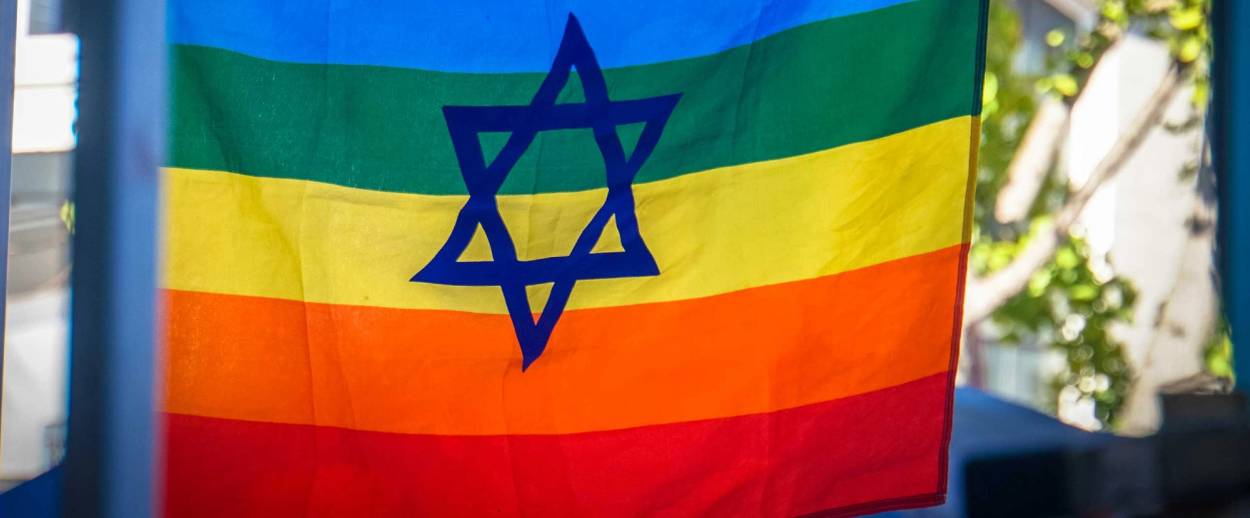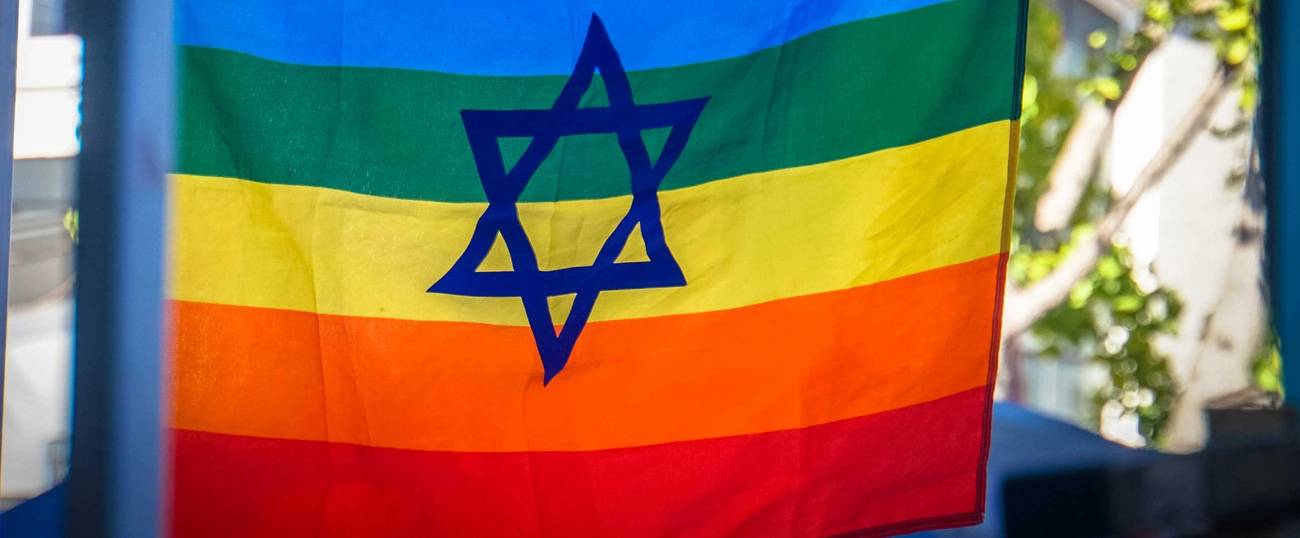Dykes vs. Kikes
Chicago’s Dyke March targets LGBTQ Jews with old-fashioned anti-Semitism




It was only a matter of time before they came for the Jews.
Last weekend, organizers of Chicago’s Dyke March asked three participants carrying Jewish LGBT pride flags—a Star of David embossed over the traditional rainbow—to leave. “It was a flag from my congregation which celebrates my queer, Jewish identity,” Laurel Grauer told the Windy City Times. According to the paper, Grauer “lost count of the number of people who harassed her” at the festival. The only other individuals to be treated in such fashion were a contingent of Christian anti-gay activists, whom marchers surrounded with “sheets of tarpaulin, trans pride flags and bed linen” so that their hateful signs could not be seen.
Asked to explain why they would kick Jews out of their event, Dyke March organizers were unapologetic and unambiguous. The flags, they explained, “made people feel unsafe” and the march was “anti-Zionist.” Forget equating a piece of cloth with an act of physical intimidation, an illustration of the hysterical progressive rhetoric that likens speech to “violence.” There was nothing “Zionist” about the allegedly threatening flag (other than its containing the Star of David, which also appears on the Israeli flag). What made these people “feel unsafe” was the presence of Jews. Censoring this Jewish symbol, meanwhile, organizers were perfectly content to let participants wave the flag of Palestine, a political entity where LGBT people are routinely harassed and murdered.
This incident calls to mind another occurrence in Chicago. In 2016, a howling mob descended upon a Shabbat service at the National LGBTQ Task Force convention hosted by A Wider Bridge, a group that strengthens relationships between the Israeli and North American LGBT communities. That assault, directed at an organization explicitly involved in promoting Israel, at least had the pretense of being “anti-Zionist.” What happened last weekend in Chicago was nothing less than anti-Semitic.
For years, battles have raged in various cities over whether anti-Israel activists should be permitted to march in gay pride parades. Groupuscules like Queers Undermining Israeli Terrorism (QUIT) and Queers Undermining Israeli Apartheid have forced their way into events ostensibly intended to celebrate LGBT community, not single out the world’s sole Jewish state for censure. Now, the effort has shifted from inserting anti-Israel activism into the gay rights movement to outright discriminating against Jews.
Ironically, these attempts to marginalize Jews have coincided with a broader effort by some radical LGBT activists to hijack pride festivals in the name of minority inclusion. Being welcomed as “guests of honor” at least year’s Toronto Pride, for instance, didn’t stop Black Lives Matter activists from successfully halting the parade to demand “prioritizing black trans women” in hiring and “a commitment to more black deaf & hearing ASL interpreters.” For its festival this summer, the city of Philadelphia redesigned the traditional rainbow pride flag by adding black and brown stripes, a move that, aside from its aesthetic indecorousness, is redundant given how the rainbow, by its very nature, is inherently a symbol of diversity. (As to the inevitable complaint that the multicolored bow, as currently constituted, does not adequately represent “black and brown” people, one wonders where are all the red, orange, yellow, green, blue, indigo and violet people?)
If these calls for inclusivity, however disruptively registered, were limited merely to increasing the visibility of certain historically marginalized groups, that would be one thing. But all too often they come wrapped up with ultimatums that others be excluded. The Black Lives Matter activists in Toronto didn’t just demand more money for black pride events; they also insisted that uniformed police officers be prevented from participating in future festivals, a demand to which the organizers shamefully acceded this year. Earlier this month, activists from an organization called “No Justice No Pride” held up the parade in Washington, D.C., demanding that not only gay cops be barred from participating, but that organizers cancel sponsorships with “Wells Fargo, Lockheed Martin, BAE Systems, Leidos, Northrop Grumman, and any other defense contractors.” It wasn’t so long ago in this country that law enforcement was raiding gay bars and entrapping gay people. Decades of activism, education, and outreach to police departments radically changed the relationship between LGBT people and law enforcement from one of antagonism to cooperation. Insisting that cops—gay cops especially—be prevented from attending pride events isn’t just disrespectful; it’s actively inviting violence from those who still wish to do us harm.
The mainstream gay rights movement has always been pro-American, appealing to foundational American values and ideals in making the moral case for LGBT equality. Gays advocated for the right to marriage and military service because they love their country and want to be equal citizens of it. Let there be no mistake: This current crop of gay activists despises America. The only other flag to be banned at Chicago’s Dyke March was the American one, deemed a “sign of oppression,” putting the exiled Jews in good company. Indeed, one cannot help but notice how often those people who hate America tend to hate Jews, and vice versa.
Last weekend’s outrage in Chicago is but the latest example of Jews being written out of progressive movements. Whether Jeremy Corbyn’s Labour Party or Linda Sarsour’s #Resistance, Jews are not only being made to feel unwelcome in left-leaning spaces, but anti-Semitism—masked as anti-Zionism—is becoming a marker of virtue. These episodes of ostracism are almost always undertaken to appease Muslims, which makes no sense under any circumstances, least of all for the LGBT community, which is welcomed and celebrated in the world’s only Jewish country and subject to state-sponsored harassment, imprisonment, and murder in nearly every Muslim-majority one.
It’s also cruelly ironic that Jews, of all people, would be subject to this sort of discrimination, given the disproportionate role they have played in LGBT politics and culture. The first homosexual advocacy organization, the Scientific Humanitarian Committee, was founded by a German Jew, Magnus Hirschfeld, whose pioneering work made him an enemy of the Nazis. The grandfather of the modern American gay rights movement, Frank Kameny, was Jewish, as is our most famous AIDS activist, Larry Kramer. Harvey Milk, one of the first openly gay people elected to public office in the United States, was a Jew, as is, of course, Barney Frank, one of the first openly gay congressmen. I could go on and on and on.
Watching this American LGBT movement infighting must seem strange to those from the many parts of the world where gay communities are fighting just for the basic right to exist. The notion of banning fellow gays from inclusion based solely upon their religious-ethnic identity must seem so preposterous, so strategically self-defeating that it could only be the work of a community too comfortable to realize its own good fortune. That, as well as the product of a commitment to a rancid political dogma known as “intersectionality,” which mandates one group of people, Jews, be stigmatized as the price of adherence to a victim hierarchy that imparts varying levels of virtue to individuals based upon their identity, with Muslims ranking highest.
“I was here as a proud Jew in all of my identities,” an Iranian Jewish lesbian told the Windy City Times about being forced to leave the festival. “The Dyke March is supposed to be intersectional. I don’t know why my identity is excluded from that. I felt that, as a Jew, I am not welcome here.” This is, alas, the ineluctable logic of intersectionality as defined by contemporary progressives: Judenrein gay pride parades.
***
Like this article? Sign up for our Daily Digest to get Tablet Magazine’s new content in your inbox each morning.
James Kirchick is a Tablet columnist and the author of Secret City: The Hidden History of Gay Washington (Henry Holt, 2022). He tweets @jkirchick.